Unit 4 Sharing Reading and Thinking 同步练习(Word版附答案解析)
文档属性
| 名称 | Unit 4 Sharing Reading and Thinking 同步练习(Word版附答案解析) | 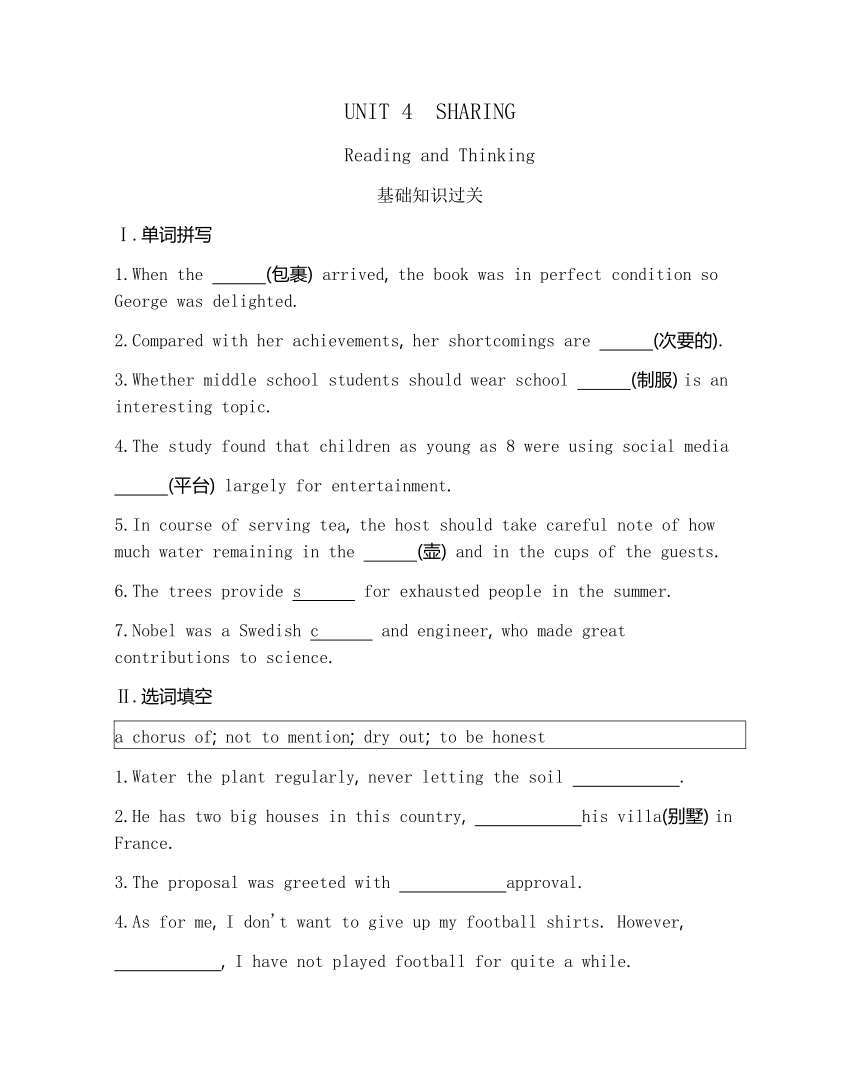 | |
| 格式 | zip | ||
| 文件大小 | 40.9KB | ||
| 资源类型 | 教案 | ||
| 版本资源 | 人教版(2019) | ||
| 科目 | 英语 | ||
| 更新时间 | 2022-01-13 17:48:02 | ||
图片预览

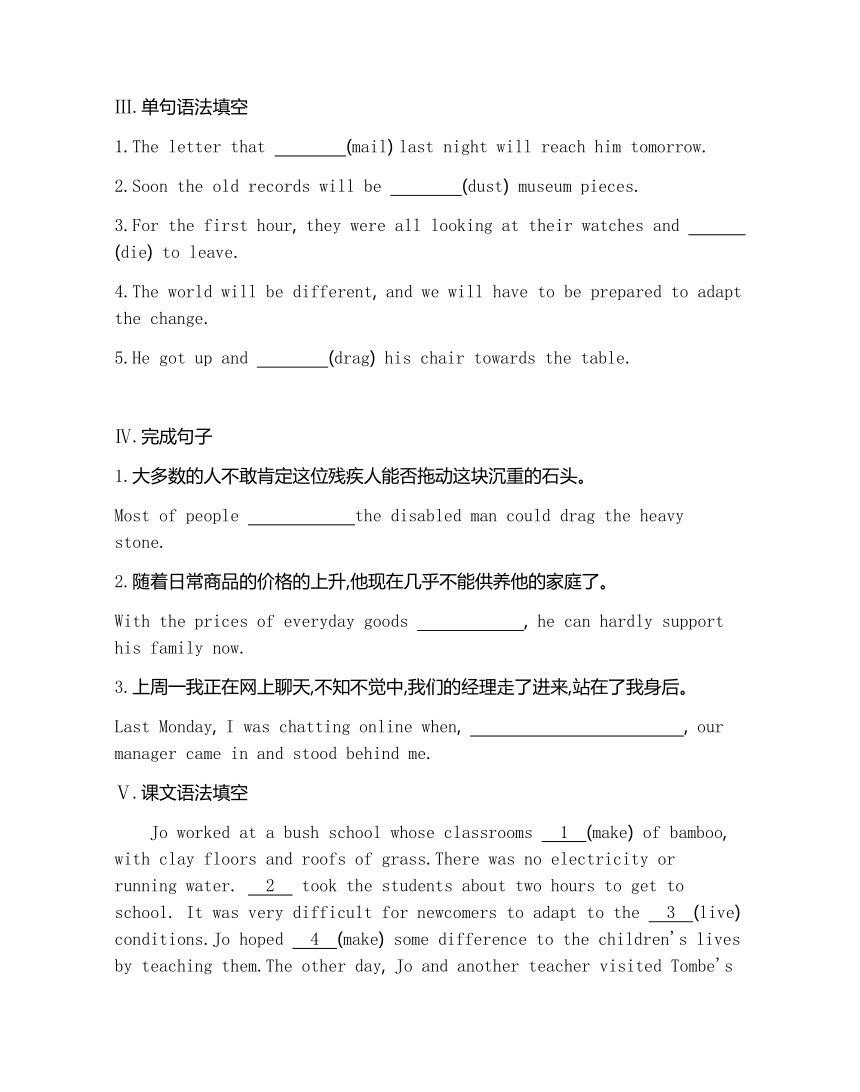
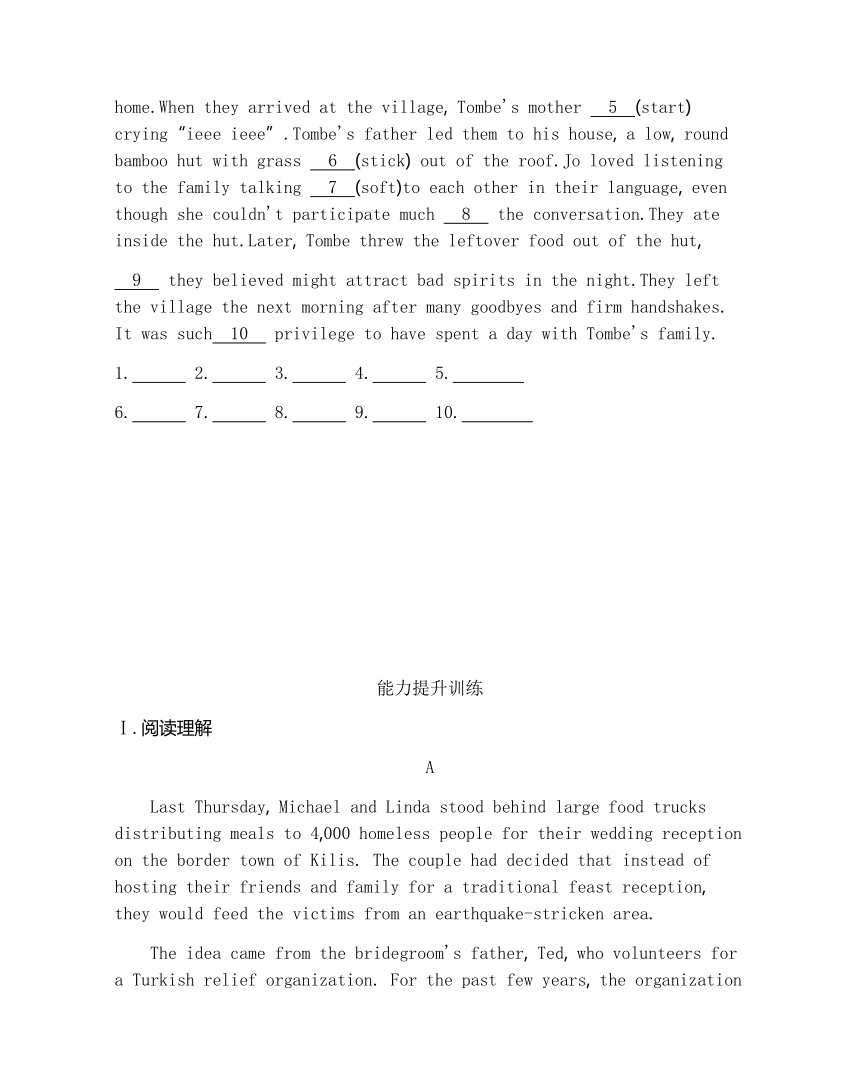
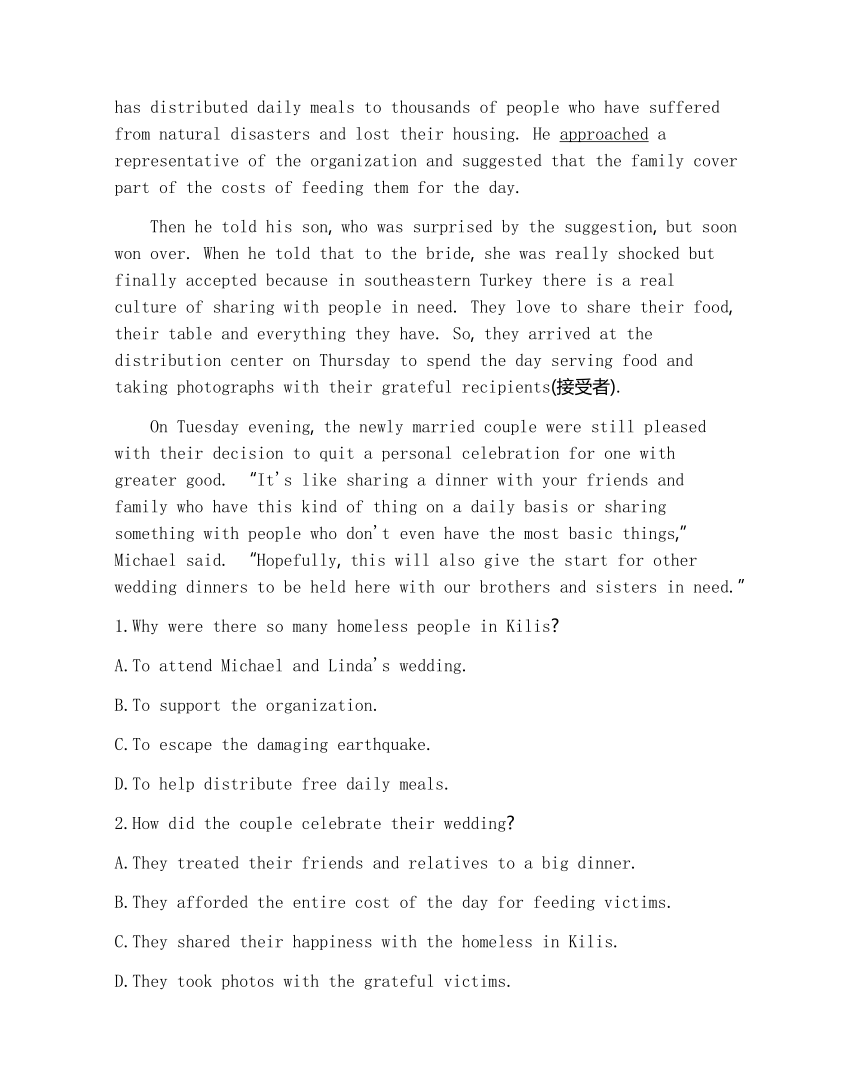
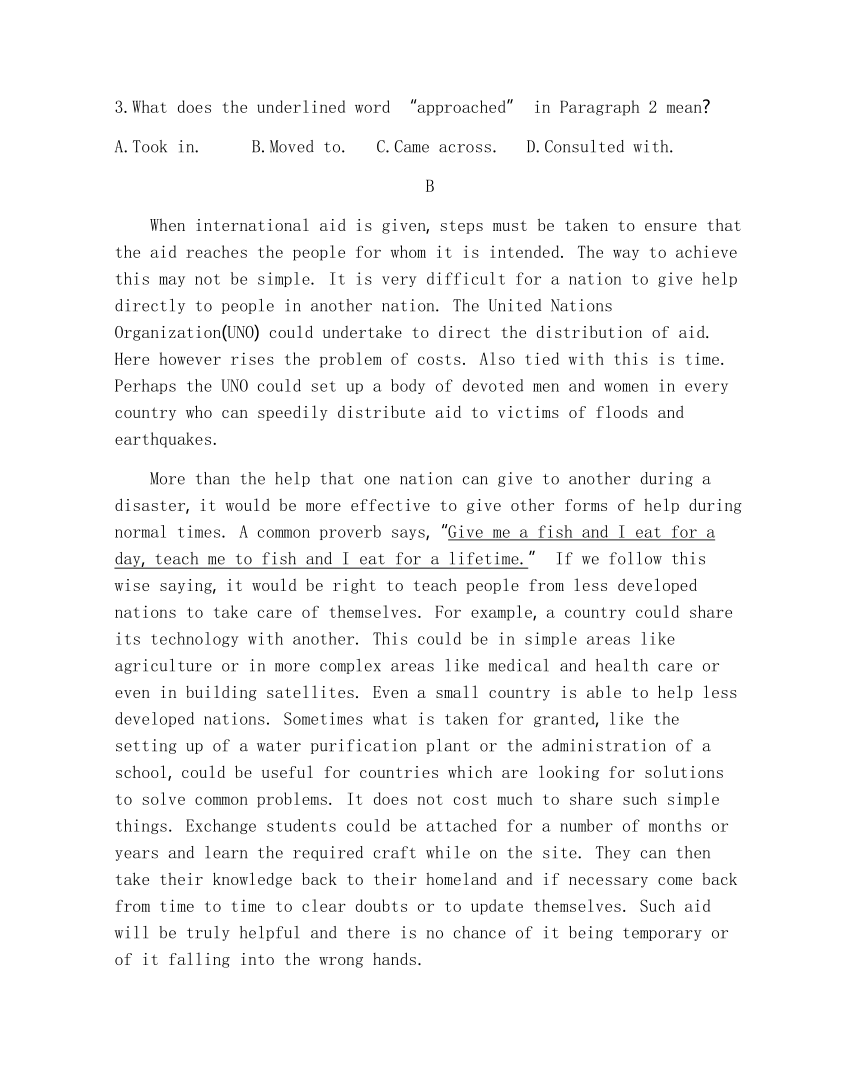
文档简介
UNIT 4 SHARING
Reading and Thinking
基础知识过关
Ⅰ.单词拼写
1.When the (包裹) arrived, the book was in perfect condition so George was delighted.
2.Compared with her achievements, her shortcomings are (次要的).
3.Whether middle school students should wear school (制服) is an interesting topic.
4.The study found that children as young as 8 were using social media
(平台) largely for entertainment.
5.In course of serving tea, the host should take careful note of how much water remaining in the (壶) and in the cups of the guests.
6.The trees provide s for exhausted people in the summer.
7.Nobel was a Swedish c and engineer, who made great contributions to science.
Ⅱ.选词填空
a chorus of; not to mention; dry out; to be honest
1.Water the plant regularly, never letting the soil .
2.He has two big houses in this country, his villa(别墅) in France.
3.The proposal was greeted with approval.
4.As for me, I don't want to give up my football shirts. However,
, I have not played football for quite a while.
Ⅲ.单句语法填空
1.The letter that (mail) last night will reach him tomorrow.
2.Soon the old records will be (dust) museum pieces.
3.For the first hour, they were all looking at their watches and (die) to leave.
4.The world will be different, and we will have to be prepared to adapt the change.
5.He got up and (drag) his chair towards the table.
Ⅳ.完成句子
1.大多数的人不敢肯定这位残疾人能否拖动这块沉重的石头。
Most of people the disabled man could drag the heavy stone.
2.随着日常商品的价格的上升,他现在几乎不能供养他的家庭了。
With the prices of everyday goods , he can hardly support his family now.
3.上周一我正在网上聊天,不知不觉中,我们的经理走了进来,站在了我身后。
Last Monday, I was chatting online when, , our manager came in and stood behind me.
Ⅴ.课文语法填空
Jo worked at a bush school whose classrooms 1 (make) of bamboo, with clay floors and roofs of grass.There was no electricity or running water. 2 took the students about two hours to get to school. It was very difficult for newcomers to adapt to the 3 (live) conditions.Jo hoped 4 (make) some difference to the children's lives by teaching them.The other day, Jo and another teacher visited Tombe's home.When they arrived at the village, Tombe's mother 5 (start) crying“ieee ieee”.Tombe's father led them to his house, a low, round bamboo hut with grass 6 (stick) out of the roof.Jo loved listening to the family talking 7 (soft)to each other in their language, even though she couldn't participate much 8 the conversation.They ate inside the hut.Later, Tombe threw the leftover food out of the hut,
9 they believed might attract bad spirits in the night.They left the village the next morning after many goodbyes and firm handshakes. It was such 10 privilege to have spent a day with Tombe's family.
1. 2. 3. 4. 5.
6. 7. 8. 9. 10.
能力提升训练
Ⅰ.阅读理解
A
Last Thursday, Michael and Linda stood behind large food trucks distributing meals to 4,000 homeless people for their wedding reception on the border town of Kilis. The couple had decided that instead of hosting their friends and family for a traditional feast reception, they would feed the victims from an earthquake-stricken area.
The idea came from the bridegroom's father, Ted, who volunteers for a Turkish relief organization. For the past few years, the organization has distributed daily meals to thousands of people who have suffered from natural disasters and lost their housing. He approached a representative of the organization and suggested that the family cover part of the costs of feeding them for the day.
Then he told his son, who was surprised by the suggestion, but soon won over. When he told that to the bride, she was really shocked but finally accepted because in southeastern Turkey there is a real culture of sharing with people in need. They love to share their food, their table and everything they have. So, they arrived at the distribution center on Thursday to spend the day serving food and taking photographs with their grateful recipients(接受者).
On Tuesday evening, the newly married couple were still pleased with their decision to quit a personal celebration for one with greater good. “It's like sharing a dinner with your friends and family who have this kind of thing on a daily basis or sharing something with people who don't even have the most basic things,” Michael said. “Hopefully, this will also give the start for other wedding dinners to be held here with our brothers and sisters in need.”
1.Why were there so many homeless people in Kilis
A.To attend Michael and Linda's wedding.
B.To support the organization.
C.To escape the damaging earthquake.
D.To help distribute free daily meals.
2.How did the couple celebrate their wedding
A.They treated their friends and relatives to a big dinner.
B.They afforded the entire cost of the day for feeding victims.
C.They shared their happiness with the homeless in Kilis.
D.They took photos with the grateful victims.
3.What does the underlined word “approached” in Paragraph 2 mean
A.Took in. B.Moved to. C.Came across. D.Consulted with.
B
When international aid is given, steps must be taken to ensure that the aid reaches the people for whom it is intended. The way to achieve this may not be simple. It is very difficult for a nation to give help directly to people in another nation. The United Nations Organization(UNO) could undertake to direct the distribution of aid. Here however rises the problem of costs. Also tied with this is time. Perhaps the UNO could set up a body of devoted men and women in every country who can speedily distribute aid to victims of floods and earthquakes.
More than the help that one nation can give to another during a disaster, it would be more effective to give other forms of help during normal times. A common proverb says,“Give me a fish and I eat for a day, teach me to fish and I eat for a lifetime.” If we follow this wise saying, it would be right to teach people from less developed nations to take care of themselves. For example, a country could share its technology with another. This could be in simple areas like agriculture or in more complex areas like medical and health care or even in building satellites. Even a small country is able to help less developed nations. Sometimes what is taken for granted, like the setting up of a water purification plant or the administration of a school, could be useful for countries which are looking for solutions to solve common problems. It does not cost much to share such simple things. Exchange students could be attached for a number of months or years and learn the required craft while on the site. They can then take their knowledge back to their homeland and if necessary come back from time to time to clear doubts or to update themselves. Such aid will be truly helpful and there is no chance of it being temporary or of it falling into the wrong hands.
Many countries run extensive courses in all sorts of skills. It will not cost much to include deserving foreigners in these courses. Besides giving effective help to the countries concerned, there is also the build-up of friendships to consider. Giving direct help by giving materials may be effective in the short run and must continue to be given in the event of emergencies. However, in the long run what is really effective would be the sharing of knowledge.
4.The second paragraph is developed mainly .
A.by making analyses. B.by stating processes.
C.by giving examples. D.by making contrasts.
5.What does the author try to express in the underlined sentence
A.Providing food is vital.
B.Learning to fish is helpful.
C.Looking after others is important.
D.Teaching techniques is vital.
6.Which aid is likely to fall into the wrong hands
A.A medical team. B.Financial support.
C.A water plant. D.An exchange program.
7.What can we infer about international aid from the passage
A.It is facing difficulties.
B.It is unnecessary during normal times.
C.It should be given in the form of materials.
D.It has gained support by developed countries.
Ⅱ.七选五
Volunteering is a great way to support an organization and make a difference in your community. It can also be an opportunity to meet new people and learn new skills. 1 And what should we plan for Here's a guide for beginners.
Step 1: 2
Do you want to help the world, or your community Do you want to build your own skills, make new friends, and learn Do you love what you do Do you want to share your gifts with others or give something back Think about these kinds of questions. That can help you to choose the right direction for your volunteer work.
Step 2:Choose an organization that is meaningful to you.
If you feel strongly about literacy (读写能力), for instance, volunteer at your local library or find out if there is an organization of volunteer tutors in your area. There are organizations doing all sorts of work. 3
Step 3:Start small.
If you already have a busy school life, volunteer your time for an hour or two a week, or perhaps one day a month. 4 Then, if you find you enjoy the work and have more time to do it, spend more time on it gradually.
Step 4:Get training.
If there is a training course, attend it. If not, talk to the group leaders and other volunteers about their experiences. 5
Step 5:Try not to give up.
Volunteer work sometimes involves unpleasant tasks, difficult fellow workers, busy days, or bad management. If you find your work difficult, however, try to work through it before you decide to quit.
A.Do you love to work with people
B.But how do we go about volunteering
C.Get to know others in the organization.
D.Think about why you want to volunteer.
E.It is important that you choose something that you like.
F.You'll pick up some good tips to make your work there more productive.
G.You might be surprised by how much you can do in even a little bit of time.
1. 2. 3. 4. 5.
参考答案
基础知识过关
Ⅰ.1.parcel 2.secondary 3.uniform(s) 4.platforms 5.kettle
6.shade 7.chemist
Ⅱ.1.dry out 2.not to mention 3.a chorus of 4.to be honest
Ⅲ.1.was mailed 考查时态和语态。句意:昨晚邮寄的那封信明天将会到达他手中。根据时间状语last night可知,此处应用一般过去时,且定语从句的先行词The letter和mail之间是被动关系,故应用一般过去时的被动语态。
2.dusty 考查形容词。句意:很快,旧唱片就会变成尘封的博物馆展品。修饰名词pieces应用形容词,故填dusty。
3.dying 考查固定用法。句意:头一个小时里,他们都在看手表,极想离开。be dying to do...意为“渴望做……”。故填dying。
4.to 考查介词。句意:世界将会不同,我们必须做好准备以适应变化。adapt to...意为“适应……”,是固定搭配,故填介词to。
5.dragged 考查时态。句意:他站起来把他的椅子拖向桌子。根据got 可知此处应用一般过去时,故填dragged。
Ⅳ.1.doubted whether/if 2.going up 3.before I knew it
Ⅴ.1.were made 考查时态、语态和主谓一致。句意:乔在一所灌木丛学校工作,那里的教室是用竹子做的,黏土的地面,草做的屋顶。由上下文的语境及时态可知用一般过去时,且classrooms为复数形式,和make之间是被动关系,故填were made。
2.It 考查代词。句意:学生们花大约两个小时到学校。it takes/took sb.+时间+to do sth.意为“做某事花费某人……时间”。
3.living 考查形容词。句意:新来的人很难适应这里的生活条件。设空处作定语,应用形容词。living conditions意为“居住条件”。
4.to make 考查动词不定式。句意:乔希望通过教育孩子们给他们的生活带来一些变化。hope to do sth.意为“希望做某事”。
5.started 考查时态。句意:当她们到达村子时,汤贝的妈妈开始喊“咿咿”。 根据从句中的arrived可知此处应用一般过去时,故填started。
6.sticking 考查现在分词。句意:汤贝的父亲把她们领到自己的房子处,那是一间低矮的圆形竹屋,屋顶上长着草。此处是with的复合结构,grass和stick之间是主动关系,故填sticking。
7.softly 考查副词。句意:乔喜欢听这家人用他们的语言轻声交谈,尽管她无法更多地参与他们的谈话。修饰动词talking应用副词,故填softly。
8.in 考查介词。句意同上。participate in意为“参与”,故填介词in。
9.which 考查定语从句。句意:随后,汤贝把吃剩的食物扔出了小屋,他们认为这些食物可能会在晚上招来恶灵。分析句子结构可知设空处引导非限制性定语从句,they believed是插入语,先行词是the leftover food,指物,故用which。
10.a 考查冠词。句意:和汤贝一家人度过了一天,真是荣幸。 此处privilege意为“荣幸”,是可数名词,此处是泛指,故用不定冠词。
能力提升训练
Ⅰ.A
语篇解读 本文是一篇记叙文。文章主要讲述了一对土耳其新婚夫妇迈克尔和琳达在婚礼上给遭遇地震而无家可归的人分发食物的故事。
1.C 细节理解题。根据第一段中的they would feed the victims from an earthquake-stricken area可知故事发生在一场地震后,从地震中逃出来的人变得无家可归。故C项正确。
2.C 推理判断题。根据第一段内容可知这对夫妻在边境城镇基利斯举行婚礼,婚礼通过救济灾民的方式来庆祝。故C项正确。由第二段最后一句可知B项错误。
3.D 词义猜测题。根据第二段第一句可知Ted先想到了这个主意,于是他去和慈善组织的代表接洽。故画线词approached意为“与……接洽”,而consult with意为“与……商议”,二者意思相近,故D项正确。take in欺骗;move to搬到;come across偶然遇见。
B
语篇解读 本文是一篇说明文,主要讲述灾难在全球是不可避免的,国际援助要落到实处,要有高效的措施。作者还认为高效的援助不在于物质,而在于技术和知识的共享。
4.C 推理判断题。 根据第二段的第四至七句可知,国家间可以分享技术,可能是在简单的领域,如农业,或在更复杂的领域,如医疗保健,甚至在制造卫星方面,即使是一个小国也能帮助欠发达国家,有时,一些被认为是理所当然的事情,例如建立一个水净化厂或管理一所学校,可能对寻求解决共同问题的办法的国家有用。所以本段主题是“加强技术交流”。段中使用了for example,并多次使用了like,所以主要使用例证法来展开论述,故选C。
5.D 词义猜测题。Give me a fish and I eat for day, teach me to fish and I eat for a lifetime.“授人以鱼不如授人以渔”强调的是“渔”(技术)。由后文For example, a country could share its technology with another.(一个国家可以与另一国共享技术)可进一步证明作者用画线句子是想表达技术的重要性,故选D。
6.B 细节理解题。由段尾句可知这里说的是技术知识交流不可能落入坏人之手,而一般救援灾区的主要是各地捐赠的钱和物,如果落入坏人之手,那可能造成救援的钱和物被贪污或挪作他用。故选B。根据第二段中提到的 medical and health care,water purification plant和Exchange students 可排除A、C、D三项。
7.A 推理判断题。由文章首段首句可知,在提供国际援助时,必须采取措施,以确保援助能够落实。根据第二段首句可知,比起一个国家在灾难中给予另一个国家的帮助,在正常时期给予其他形式的帮助会更有效。由第三段首句可知,许多国家开设了大量的各种技能的课程。由此可知第二段和第三段分别阐述如何解决国际援助面临的问题,由此可以推断国际援助正面临着困难,故选A。根据第二段首句可排除B项,文章主张以技术共享的形式提供国际援助,故排除C项,D项文中未提及。
Ⅱ.语篇解读 本文是一篇说明文。作者给刚从事志愿者服务工作的人介绍了从事志愿活动的方式与注意事项。
1.B 根据空前It can also be an opportunity to meet new people and learn new skills.(它也可能是结识新朋友、学习新技能的机会)以及空后And what should we plan for Here's a guide for beginners.(我们应该计划什么 这里有初学者的指南)可知B项(但我们怎么开始志愿活动呢 )承上启下,符合语境,故选B。
2.D 根据下文文章结构可知该空是下段的主旨句。根据下文尤其是最后两句Think about these kinds of questions. That can help you to choose the right direction for your volunteer work.(想想这几类问题。那可以帮助你为你的志愿者工作选择正确的方向)可知D项(想想你为什么想当志愿者)符合语境,故选D。
3.E 根据本段标题及空前的There are organizations doing all sorts of work.(有做各种各样工作的组织)可知E项(选择你喜欢的东西是很重要的)承接上文,符合语境,故选E。
4.G 根据本段标题及空前的If you already have a busy school life, volunteer your time for an hour or two a week, or perhaps one day a month.(如果你的学校生活已经很繁忙,一周做一两个小时的志愿者,或者大概一个月做一天志愿者)可知G项(你可能会惊讶于你甚至在一点点时间内就能做到这么多)承接上文,符合语境,故选G。
5.F 根据空前的If there is a training course, attend it. If not, talk to the group leaders and other volunteers about their experiences.(如果有培训课,就参加。如果没有,去和组长和其他志愿者聊聊他们的经历)可知F项(你会得到一些好的建议,使你在那里的工作更有成效)承接上文,符合语境,故选F。
Reading and Thinking
基础知识过关
Ⅰ.单词拼写
1.When the (包裹) arrived, the book was in perfect condition so George was delighted.
2.Compared with her achievements, her shortcomings are (次要的).
3.Whether middle school students should wear school (制服) is an interesting topic.
4.The study found that children as young as 8 were using social media
(平台) largely for entertainment.
5.In course of serving tea, the host should take careful note of how much water remaining in the (壶) and in the cups of the guests.
6.The trees provide s for exhausted people in the summer.
7.Nobel was a Swedish c and engineer, who made great contributions to science.
Ⅱ.选词填空
a chorus of; not to mention; dry out; to be honest
1.Water the plant regularly, never letting the soil .
2.He has two big houses in this country, his villa(别墅) in France.
3.The proposal was greeted with approval.
4.As for me, I don't want to give up my football shirts. However,
, I have not played football for quite a while.
Ⅲ.单句语法填空
1.The letter that (mail) last night will reach him tomorrow.
2.Soon the old records will be (dust) museum pieces.
3.For the first hour, they were all looking at their watches and (die) to leave.
4.The world will be different, and we will have to be prepared to adapt the change.
5.He got up and (drag) his chair towards the table.
Ⅳ.完成句子
1.大多数的人不敢肯定这位残疾人能否拖动这块沉重的石头。
Most of people the disabled man could drag the heavy stone.
2.随着日常商品的价格的上升,他现在几乎不能供养他的家庭了。
With the prices of everyday goods , he can hardly support his family now.
3.上周一我正在网上聊天,不知不觉中,我们的经理走了进来,站在了我身后。
Last Monday, I was chatting online when, , our manager came in and stood behind me.
Ⅴ.课文语法填空
Jo worked at a bush school whose classrooms 1 (make) of bamboo, with clay floors and roofs of grass.There was no electricity or running water. 2 took the students about two hours to get to school. It was very difficult for newcomers to adapt to the 3 (live) conditions.Jo hoped 4 (make) some difference to the children's lives by teaching them.The other day, Jo and another teacher visited Tombe's home.When they arrived at the village, Tombe's mother 5 (start) crying“ieee ieee”.Tombe's father led them to his house, a low, round bamboo hut with grass 6 (stick) out of the roof.Jo loved listening to the family talking 7 (soft)to each other in their language, even though she couldn't participate much 8 the conversation.They ate inside the hut.Later, Tombe threw the leftover food out of the hut,
9 they believed might attract bad spirits in the night.They left the village the next morning after many goodbyes and firm handshakes. It was such 10 privilege to have spent a day with Tombe's family.
1. 2. 3. 4. 5.
6. 7. 8. 9. 10.
能力提升训练
Ⅰ.阅读理解
A
Last Thursday, Michael and Linda stood behind large food trucks distributing meals to 4,000 homeless people for their wedding reception on the border town of Kilis. The couple had decided that instead of hosting their friends and family for a traditional feast reception, they would feed the victims from an earthquake-stricken area.
The idea came from the bridegroom's father, Ted, who volunteers for a Turkish relief organization. For the past few years, the organization has distributed daily meals to thousands of people who have suffered from natural disasters and lost their housing. He approached a representative of the organization and suggested that the family cover part of the costs of feeding them for the day.
Then he told his son, who was surprised by the suggestion, but soon won over. When he told that to the bride, she was really shocked but finally accepted because in southeastern Turkey there is a real culture of sharing with people in need. They love to share their food, their table and everything they have. So, they arrived at the distribution center on Thursday to spend the day serving food and taking photographs with their grateful recipients(接受者).
On Tuesday evening, the newly married couple were still pleased with their decision to quit a personal celebration for one with greater good. “It's like sharing a dinner with your friends and family who have this kind of thing on a daily basis or sharing something with people who don't even have the most basic things,” Michael said. “Hopefully, this will also give the start for other wedding dinners to be held here with our brothers and sisters in need.”
1.Why were there so many homeless people in Kilis
A.To attend Michael and Linda's wedding.
B.To support the organization.
C.To escape the damaging earthquake.
D.To help distribute free daily meals.
2.How did the couple celebrate their wedding
A.They treated their friends and relatives to a big dinner.
B.They afforded the entire cost of the day for feeding victims.
C.They shared their happiness with the homeless in Kilis.
D.They took photos with the grateful victims.
3.What does the underlined word “approached” in Paragraph 2 mean
A.Took in. B.Moved to. C.Came across. D.Consulted with.
B
When international aid is given, steps must be taken to ensure that the aid reaches the people for whom it is intended. The way to achieve this may not be simple. It is very difficult for a nation to give help directly to people in another nation. The United Nations Organization(UNO) could undertake to direct the distribution of aid. Here however rises the problem of costs. Also tied with this is time. Perhaps the UNO could set up a body of devoted men and women in every country who can speedily distribute aid to victims of floods and earthquakes.
More than the help that one nation can give to another during a disaster, it would be more effective to give other forms of help during normal times. A common proverb says,“Give me a fish and I eat for a day, teach me to fish and I eat for a lifetime.” If we follow this wise saying, it would be right to teach people from less developed nations to take care of themselves. For example, a country could share its technology with another. This could be in simple areas like agriculture or in more complex areas like medical and health care or even in building satellites. Even a small country is able to help less developed nations. Sometimes what is taken for granted, like the setting up of a water purification plant or the administration of a school, could be useful for countries which are looking for solutions to solve common problems. It does not cost much to share such simple things. Exchange students could be attached for a number of months or years and learn the required craft while on the site. They can then take their knowledge back to their homeland and if necessary come back from time to time to clear doubts or to update themselves. Such aid will be truly helpful and there is no chance of it being temporary or of it falling into the wrong hands.
Many countries run extensive courses in all sorts of skills. It will not cost much to include deserving foreigners in these courses. Besides giving effective help to the countries concerned, there is also the build-up of friendships to consider. Giving direct help by giving materials may be effective in the short run and must continue to be given in the event of emergencies. However, in the long run what is really effective would be the sharing of knowledge.
4.The second paragraph is developed mainly .
A.by making analyses. B.by stating processes.
C.by giving examples. D.by making contrasts.
5.What does the author try to express in the underlined sentence
A.Providing food is vital.
B.Learning to fish is helpful.
C.Looking after others is important.
D.Teaching techniques is vital.
6.Which aid is likely to fall into the wrong hands
A.A medical team. B.Financial support.
C.A water plant. D.An exchange program.
7.What can we infer about international aid from the passage
A.It is facing difficulties.
B.It is unnecessary during normal times.
C.It should be given in the form of materials.
D.It has gained support by developed countries.
Ⅱ.七选五
Volunteering is a great way to support an organization and make a difference in your community. It can also be an opportunity to meet new people and learn new skills. 1 And what should we plan for Here's a guide for beginners.
Step 1: 2
Do you want to help the world, or your community Do you want to build your own skills, make new friends, and learn Do you love what you do Do you want to share your gifts with others or give something back Think about these kinds of questions. That can help you to choose the right direction for your volunteer work.
Step 2:Choose an organization that is meaningful to you.
If you feel strongly about literacy (读写能力), for instance, volunteer at your local library or find out if there is an organization of volunteer tutors in your area. There are organizations doing all sorts of work. 3
Step 3:Start small.
If you already have a busy school life, volunteer your time for an hour or two a week, or perhaps one day a month. 4 Then, if you find you enjoy the work and have more time to do it, spend more time on it gradually.
Step 4:Get training.
If there is a training course, attend it. If not, talk to the group leaders and other volunteers about their experiences. 5
Step 5:Try not to give up.
Volunteer work sometimes involves unpleasant tasks, difficult fellow workers, busy days, or bad management. If you find your work difficult, however, try to work through it before you decide to quit.
A.Do you love to work with people
B.But how do we go about volunteering
C.Get to know others in the organization.
D.Think about why you want to volunteer.
E.It is important that you choose something that you like.
F.You'll pick up some good tips to make your work there more productive.
G.You might be surprised by how much you can do in even a little bit of time.
1. 2. 3. 4. 5.
参考答案
基础知识过关
Ⅰ.1.parcel 2.secondary 3.uniform(s) 4.platforms 5.kettle
6.shade 7.chemist
Ⅱ.1.dry out 2.not to mention 3.a chorus of 4.to be honest
Ⅲ.1.was mailed 考查时态和语态。句意:昨晚邮寄的那封信明天将会到达他手中。根据时间状语last night可知,此处应用一般过去时,且定语从句的先行词The letter和mail之间是被动关系,故应用一般过去时的被动语态。
2.dusty 考查形容词。句意:很快,旧唱片就会变成尘封的博物馆展品。修饰名词pieces应用形容词,故填dusty。
3.dying 考查固定用法。句意:头一个小时里,他们都在看手表,极想离开。be dying to do...意为“渴望做……”。故填dying。
4.to 考查介词。句意:世界将会不同,我们必须做好准备以适应变化。adapt to...意为“适应……”,是固定搭配,故填介词to。
5.dragged 考查时态。句意:他站起来把他的椅子拖向桌子。根据got 可知此处应用一般过去时,故填dragged。
Ⅳ.1.doubted whether/if 2.going up 3.before I knew it
Ⅴ.1.were made 考查时态、语态和主谓一致。句意:乔在一所灌木丛学校工作,那里的教室是用竹子做的,黏土的地面,草做的屋顶。由上下文的语境及时态可知用一般过去时,且classrooms为复数形式,和make之间是被动关系,故填were made。
2.It 考查代词。句意:学生们花大约两个小时到学校。it takes/took sb.+时间+to do sth.意为“做某事花费某人……时间”。
3.living 考查形容词。句意:新来的人很难适应这里的生活条件。设空处作定语,应用形容词。living conditions意为“居住条件”。
4.to make 考查动词不定式。句意:乔希望通过教育孩子们给他们的生活带来一些变化。hope to do sth.意为“希望做某事”。
5.started 考查时态。句意:当她们到达村子时,汤贝的妈妈开始喊“咿咿”。 根据从句中的arrived可知此处应用一般过去时,故填started。
6.sticking 考查现在分词。句意:汤贝的父亲把她们领到自己的房子处,那是一间低矮的圆形竹屋,屋顶上长着草。此处是with的复合结构,grass和stick之间是主动关系,故填sticking。
7.softly 考查副词。句意:乔喜欢听这家人用他们的语言轻声交谈,尽管她无法更多地参与他们的谈话。修饰动词talking应用副词,故填softly。
8.in 考查介词。句意同上。participate in意为“参与”,故填介词in。
9.which 考查定语从句。句意:随后,汤贝把吃剩的食物扔出了小屋,他们认为这些食物可能会在晚上招来恶灵。分析句子结构可知设空处引导非限制性定语从句,they believed是插入语,先行词是the leftover food,指物,故用which。
10.a 考查冠词。句意:和汤贝一家人度过了一天,真是荣幸。 此处privilege意为“荣幸”,是可数名词,此处是泛指,故用不定冠词。
能力提升训练
Ⅰ.A
语篇解读 本文是一篇记叙文。文章主要讲述了一对土耳其新婚夫妇迈克尔和琳达在婚礼上给遭遇地震而无家可归的人分发食物的故事。
1.C 细节理解题。根据第一段中的they would feed the victims from an earthquake-stricken area可知故事发生在一场地震后,从地震中逃出来的人变得无家可归。故C项正确。
2.C 推理判断题。根据第一段内容可知这对夫妻在边境城镇基利斯举行婚礼,婚礼通过救济灾民的方式来庆祝。故C项正确。由第二段最后一句可知B项错误。
3.D 词义猜测题。根据第二段第一句可知Ted先想到了这个主意,于是他去和慈善组织的代表接洽。故画线词approached意为“与……接洽”,而consult with意为“与……商议”,二者意思相近,故D项正确。take in欺骗;move to搬到;come across偶然遇见。
B
语篇解读 本文是一篇说明文,主要讲述灾难在全球是不可避免的,国际援助要落到实处,要有高效的措施。作者还认为高效的援助不在于物质,而在于技术和知识的共享。
4.C 推理判断题。 根据第二段的第四至七句可知,国家间可以分享技术,可能是在简单的领域,如农业,或在更复杂的领域,如医疗保健,甚至在制造卫星方面,即使是一个小国也能帮助欠发达国家,有时,一些被认为是理所当然的事情,例如建立一个水净化厂或管理一所学校,可能对寻求解决共同问题的办法的国家有用。所以本段主题是“加强技术交流”。段中使用了for example,并多次使用了like,所以主要使用例证法来展开论述,故选C。
5.D 词义猜测题。Give me a fish and I eat for day, teach me to fish and I eat for a lifetime.“授人以鱼不如授人以渔”强调的是“渔”(技术)。由后文For example, a country could share its technology with another.(一个国家可以与另一国共享技术)可进一步证明作者用画线句子是想表达技术的重要性,故选D。
6.B 细节理解题。由段尾句可知这里说的是技术知识交流不可能落入坏人之手,而一般救援灾区的主要是各地捐赠的钱和物,如果落入坏人之手,那可能造成救援的钱和物被贪污或挪作他用。故选B。根据第二段中提到的 medical and health care,water purification plant和Exchange students 可排除A、C、D三项。
7.A 推理判断题。由文章首段首句可知,在提供国际援助时,必须采取措施,以确保援助能够落实。根据第二段首句可知,比起一个国家在灾难中给予另一个国家的帮助,在正常时期给予其他形式的帮助会更有效。由第三段首句可知,许多国家开设了大量的各种技能的课程。由此可知第二段和第三段分别阐述如何解决国际援助面临的问题,由此可以推断国际援助正面临着困难,故选A。根据第二段首句可排除B项,文章主张以技术共享的形式提供国际援助,故排除C项,D项文中未提及。
Ⅱ.语篇解读 本文是一篇说明文。作者给刚从事志愿者服务工作的人介绍了从事志愿活动的方式与注意事项。
1.B 根据空前It can also be an opportunity to meet new people and learn new skills.(它也可能是结识新朋友、学习新技能的机会)以及空后And what should we plan for Here's a guide for beginners.(我们应该计划什么 这里有初学者的指南)可知B项(但我们怎么开始志愿活动呢 )承上启下,符合语境,故选B。
2.D 根据下文文章结构可知该空是下段的主旨句。根据下文尤其是最后两句Think about these kinds of questions. That can help you to choose the right direction for your volunteer work.(想想这几类问题。那可以帮助你为你的志愿者工作选择正确的方向)可知D项(想想你为什么想当志愿者)符合语境,故选D。
3.E 根据本段标题及空前的There are organizations doing all sorts of work.(有做各种各样工作的组织)可知E项(选择你喜欢的东西是很重要的)承接上文,符合语境,故选E。
4.G 根据本段标题及空前的If you already have a busy school life, volunteer your time for an hour or two a week, or perhaps one day a month.(如果你的学校生活已经很繁忙,一周做一两个小时的志愿者,或者大概一个月做一天志愿者)可知G项(你可能会惊讶于你甚至在一点点时间内就能做到这么多)承接上文,符合语境,故选G。
5.F 根据空前的If there is a training course, attend it. If not, talk to the group leaders and other volunteers about their experiences.(如果有培训课,就参加。如果没有,去和组长和其他志愿者聊聊他们的经历)可知F项(你会得到一些好的建议,使你在那里的工作更有成效)承接上文,符合语境,故选F。
